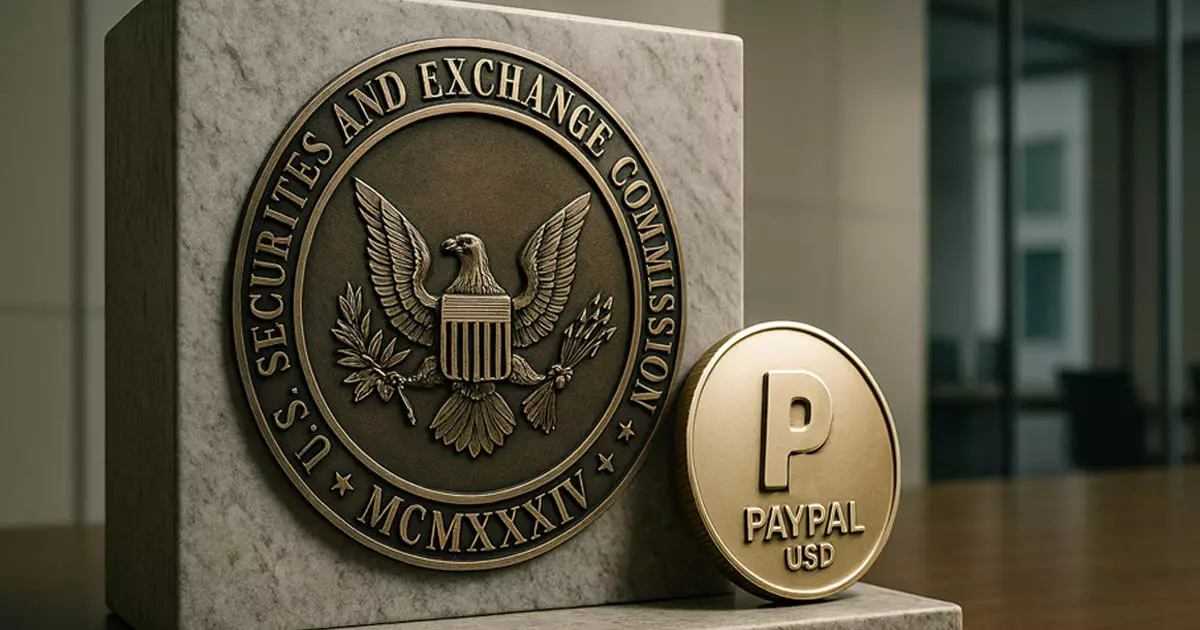In a significant pivot for the cryptocurrency landscape, the U.S. Securities and Exchange Commission (SEC) has concluded its inquiry into PayPal’s dollar-backed stablecoin, PYUSD, choosing not to pursue enforcement actions. This development is disclosed in the company’s recent 10-Q filing and marks a pivotal moment in the evolving interplay between financial technology and regulatory oversight. While the SEC has historically maintained a strict posture, particularly under the leadership of Gary Gensler, the decision to drop the inquiry offers a glimmer of hope for the industry’s stability and potential growth.
A Broader Industry Implication
The SEC’s closure of the PYUSD inquiry clears a significant regulatory hurdle for both PayPal and the stablecoin’s issuer, Paxos. This decision not only diminishes fears of an unregistered security designation but also sends a reassuring signal to investors and developers in the stablecoin space. With a current market cap of roughly $879 million, PYUSD hardly dominates the field; nonetheless, its emergence marks a substantial step for PayPal in its ambitions to establish a foothold in the crypto payment ecosystem. The closure of this inquiry could potentially influence the establishment of legislation like the GENIUS Act, which seeks to create a specific regulatory framework for payment stablecoins.
The Rise of Legislative Support
The GENIUS Act, introduced as Senate Bill 919, represents a noteworthy bipartisan effort to clarify the regulatory landscape for stablecoins. By formalizing licensing procedures and mandating monthly disclosures along with 1:1 reserve backing, the Act aims to create a sustainable environment for digital currency transactions. It’s essential to recognize that the U.S. has lagged behind other nations in embracing digital currency frameworks, and the passing of such an act would indicate that American lawmakers are beginning to grasp the importance of concrete policies regarding cryptocurrencies. It signals recognition that stablecoins like PYUSD are not only financial instruments but also essential tools for economic innovation.
Financial Strategy and Ambitions
By integrating PYUSD into its ecosystem—including well-known platforms like Venmo—PayPal is strategically positioning itself as a leader in the stablecoin realm. The fintech giant envisions offering its services to more than 20 million small businesses, allowing them to settle transactions in a stable, digital currency within the next year. Therefore, the decision to integrate PYUSD is not merely a responsive measure to regulatory scrutiny but a proactive step aimed at redefining payment interactions in a digitized economy. In essence, this could lead to a robust marketing edge over traditional financial systems, which are often bogged down by fees and delays associated with conventional banking.
The Remaining Shadows of Regulation
Despite the positive spin from the recent SEC decision, PayPal remains cautious. The company acknowledges legal ambiguities surrounding digital asset storage and the challenges posed by potential insolvency. While the absence of SEC enforcement action reduces uncertainty, it doesn’t eliminate the risks involved in navigating a fragmented regulatory landscape. Other regulatory issues, like investigations from the Consumer Financial Protection Bureau and Germany’s Federal Cartel Office, further underscore the complexities PayPal faces.
Moreover, the SEC’s parameters on what constitutes a “covered stablecoin” hint at an evolving dialogue but lack concrete legal enforcement or comprehensive guidance, leaving a noticeable gap in understanding where stablecoins fit within the broader context of securities laws. As Congress deliberates on new laws, the fate of stablecoins remains a near-term consideration, underscoring the volatility of the current crypto atmosphere.
The halt in SEC’s inquiry into PYUSD is undeniably a positive step for PayPal and the cryptocurrency industry at large, fostering an environment ripe with opportunities. Yet, discerning the future of stablecoins amid regulatory reshaping is a balancing act, one that will require astute navigation by all stakeholders involved. As digital currencies take more prominent roles in transpiring financial transactions, the hope remains that lawmakers will establish comprehensive frameworks that not only foster innovation but also protect consumers and investors. Adjusting to this new reality will demand flexibility, creativity, and above all, a collaborative effort among technologists and regulators alike.















